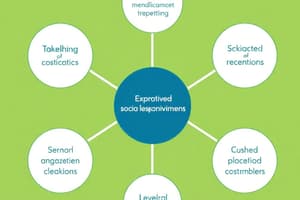Podcast
Questions and Answers
What does Inspector Goole mean when he states, 'We are members of one body. We are responsible for each other'?
What does Inspector Goole mean when he states, 'We are members of one body. We are responsible for each other'?
- Only those in positions of power should concern themselves with the lower classes.
- Everyone should prioritize self-interest above social concerns.
- Society is made up of individuals with no obligations to each other.
- There is a fundamental interconnectedness in society that demands accountability. (correct)
Which viewpoint does Mr. Arthur Birling represent in his statement, 'A man has to make his own way – has to look after himself'?
Which viewpoint does Mr. Arthur Birling represent in his statement, 'A man has to make his own way – has to look after himself'?
- A socialist perspective that values community support.
- A belief in universal equality among all people.
- Collectivism and shared responsibility.
- Capitalist individualism that undermines communal welfare. (correct)
What is Sheila Birling's perspective on the treatment of working-class individuals?
What is Sheila Birling's perspective on the treatment of working-class individuals?
- She feels indifferent towards their struggles and focuses on her own concerns.
- She believes working-class individuals are inferior to her own class.
- She believes that businesses should focus solely on profit, regardless of impact.
- She recognizes their humanity and criticizes how they are exploited. (correct)
How does Eric Birling differ from his parents regarding the issue of responsibility?
How does Eric Birling differ from his parents regarding the issue of responsibility?
What does Mrs. Sybil Birling's statement 'I accept no blame for it at all' reveal about her character?
What does Mrs. Sybil Birling's statement 'I accept no blame for it at all' reveal about her character?
What warning does Inspector Goole provide about ignoring social responsibility?
What warning does Inspector Goole provide about ignoring social responsibility?
Which statement best summarizes Sheila Birling's transformation throughout the narrative?
Which statement best summarizes Sheila Birling's transformation throughout the narrative?
How does Mr. Birling's view on the lower classes impact his attitudes toward social responsibility?
How does Mr. Birling's view on the lower classes impact his attitudes toward social responsibility?
Flashcards are hidden until you start studying
Study Notes
Inspector Goole's Philosophy
- Advocates for interconnectedness in society, emphasizing collective responsibility toward one another.
- Critiques selfishness and greed, important themes in the context of capitalism and moral duty.
- Highlights the widespread impact of individual actions through the metaphor of "Eva Smiths and John Smiths," addressing social inequality.
- Warns of dire consequences such as societal collapse or war for those who ignore the importance of social responsibility.
Mr. Arthur Birling's Views
- Embodies the capitalist belief in individualism, prioritizing self-reliance over collective duty.
- Considers the working class as expendable, demonstrating a lack of empathy and social conscience.
- Represents the older generation's resistance to change and responsibility towards social issues.
Sheila Birling's Transformation
- Recognizes the dignity of the working class, challenging exploitative views held by her family.
- Expresses deep remorse for her role in Eva Smith’s demise, signifying personal growth and acceptance of responsibility.
- Promotes the idea of breaking down barriers between social classes, advocating for empathy and understanding.
Eric Birling's Acceptance
- Confronts the family's shared guilt in Eva Smith’s death, showcasing moral awareness.
- Takes ownership of his actions without trying to deflect responsibility, contrasting with his parents' attitudes.
Mrs. Sybil Birling's Denial
- Refuses to acknowledge any personal blame, illustrating her detachment from the consequences of her actions.
- Attempts to shift blame onto others, particularly her son, reflecting a denial of familial accountability and personal responsibility.
Studying That Suits You
Use AI to generate personalized quizzes and flashcards to suit your learning preferences.




